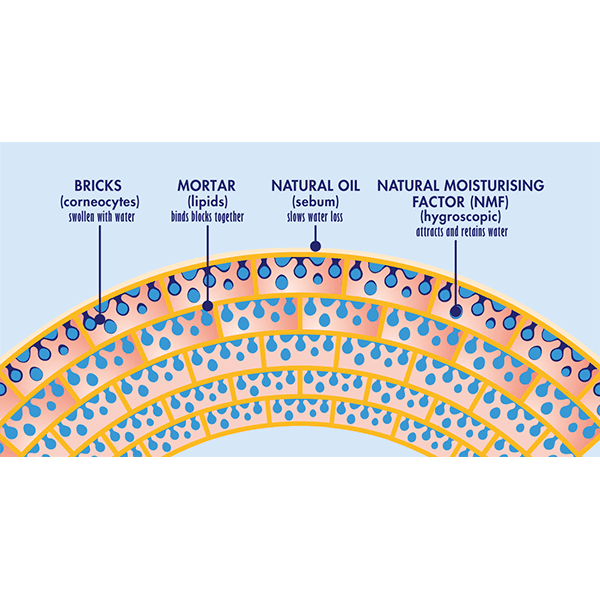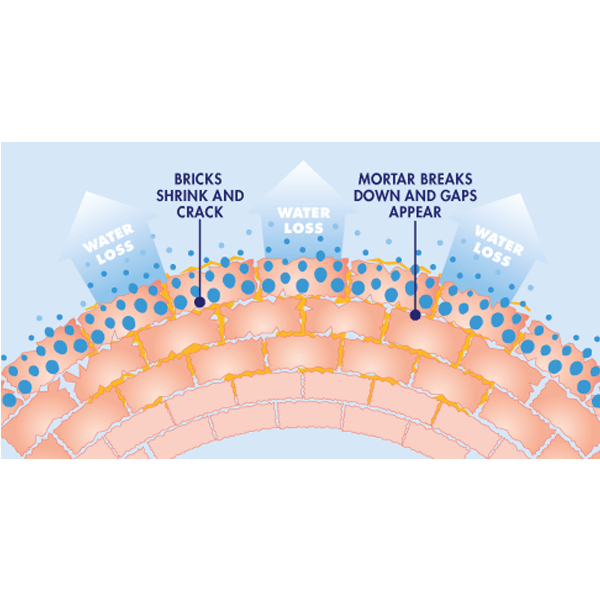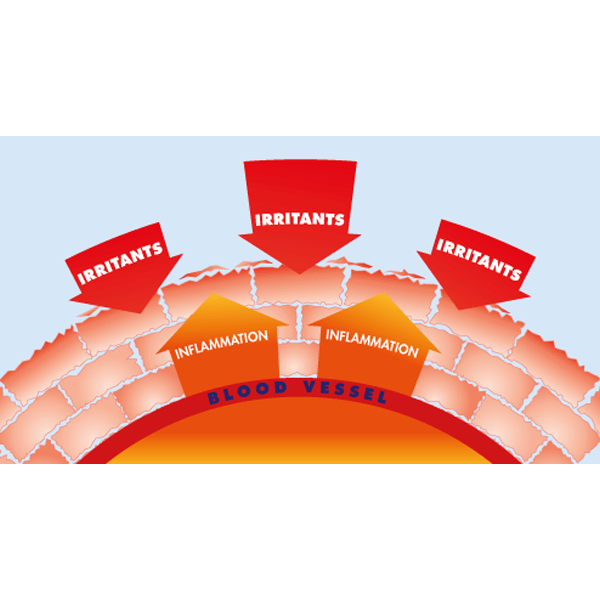
About Eczema
The skin is the largest organ in the body and is the major barrier between the inside and outside of your body. In adults, it can weigh about 5 kilograms and measure about 22 square feet.

The skin’s natural barrier
The skin protects us, helps with sensations like touch, pressure and pain, and regulates our body temperature.
It is a natural protective barrier that is made up of ‘bricks’ (corneocytes) joined together by ‘mortar’ (lipids).
In healthy skin the ‘bricks’ are full of water and fit tightly together with no gaps between them. The ‘bricks’ themselves contain Natural Moisturising Factor (NMF) which attracts and keeps in water.
It is a natural protective barrier that is made up of ‘bricks’ (corneocytes) joined together by ‘mortar’ (lipids).
In healthy skin the ‘bricks’ are full of water and fit tightly together with no gaps between them. The ‘bricks’ themselves contain Natural Moisturising Factor (NMF) which attracts and keeps in water.


When the skin gets into trouble..
In eczema, the skin barrier (our first line of defence from the outside world) is weakened because when skin is dry it is due to there not being enough ‘mortar’ between the ‘bricks’ and there is a lack of NMF within them.
This causes loss of moisture through transepidermal water loss (TEWL), where excess water is evaporated through the skin into the air resulting in dry, dehydrated skin.
The ‘bricks’ become so dry that they shrink and crack, leaving gaps in them.
This causes loss of moisture through transepidermal water loss (TEWL), where excess water is evaporated through the skin into the air resulting in dry, dehydrated skin.
The ‘bricks’ become so dry that they shrink and crack, leaving gaps in them.


Skin under attack
The gaps in the natural protective barrier (caused by not enough ‘mortar’) leave the skin open to invasion by bacteria, allergens, and irritants.
Our body’s own defence system starts to fight back and resist the invasion. It uses inflammatory cells and chemicals to do this, which produce inflammation causing redness, swelling, and itching of the skin.
Itching makes you scratch and scratching damages your skin even more by weakening the skin barrier.
Our body’s own defence system starts to fight back and resist the invasion. It uses inflammatory cells and chemicals to do this, which produce inflammation causing redness, swelling, and itching of the skin.
Itching makes you scratch and scratching damages your skin even more by weakening the skin barrier.

Did you know?
The British Association of Dermatologists (BAD) states that around 60% of patients with eczema may be clear by their teens.
However for some patients, it is more chronic and continues into adulthood.1
However for some patients, it is more chronic and continues into adulthood.1
What causes eczema?
The exact cause of eczema is unknown. However, most types are caused by a combination of genetic and environmental triggers. It affects males and females equally and having a parent or sibling who has eczema increases the chances of developing it.
A certain type of eczema, known as atopic eczema, is also part of the atopic triad. This refers to the tendency of eczema, asthma and allergies to occur together in atopic individuals.
Eczema often begins in early childhood and the disease course is variable. For some patients, symptoms decrease with age and it is not infrequent for eczema to disappear.
Eczema can affect any part of the skin. The flexural areas (creases of the joints) at the elbow, knees, wrists and neck are the most common places but it can affect the face.
A certain type of eczema, known as atopic eczema, is also part of the atopic triad. This refers to the tendency of eczema, asthma and allergies to occur together in atopic individuals.
Eczema often begins in early childhood and the disease course is variable. For some patients, symptoms decrease with age and it is not infrequent for eczema to disappear.
Eczema can affect any part of the skin. The flexural areas (creases of the joints) at the elbow, knees, wrists and neck are the most common places but it can affect the face.
NEXT SECTION
What is Eczema
Eczema is a term used to describe a group of skin conditions characterised by inflamed, itchy and reddened skin. Eczema is only one of many types of dermatitis.
Find out more about the different types of eczema
Find out more about the different types of eczema
NEXT SECTION
Living with Eczema
Living with eczema varies from person to person. Eczema can significantly impacts a person’s daily life, whether as the patient, or the parent/carer of a child with eczema.
Discover hints & tips to help manage your condition on a daily basis
Discover hints & tips to help manage your condition on a daily basis
NEXT SECTION
Treatment Options
There are many different types of treatments you can try from moisturisers to topical steroids.
Find out more about the different treatment options available.
Find out more about the different treatment options available.
NEXT SECTION
Parents & Carers
Are you a parent or a carer? Be the best that you can be at managing the eczema and dry skin of the ones you care for.
Find out more about how to support your child with their eczema.
Find out more about how to support your child with their eczema.
NEXT SECTION
Woundcare
Health skin can become vulnerable for a number of reasons.
Find out more about how emollients can support in the care of vulnerable skin.
Find out more about how emollients can support in the care of vulnerable skin.
NEXT SECTION
The Living with Eczema App
Available on iPhone and Android, Living with Eczema is designed to help patients and their parents or carers with managing eczema, all from within your pocket!
Find out more and how to download.
Find out more and how to download.
NEXT SECTION
Useful Links
There are a number of associations, charities and other bodies who provide information on eczema.
Check out useful links to help you with your condition.
Check out useful links to help you with your condition.
NEXT SECTION
What is Eczema
Eczema is a term used to describe a group of skin conditions characterised by inflamed, itchy and reddened skin. Eczema is only one of many types of dermatitis.
Find out more about the different types of eczema
Find out more about the different types of eczema
NEXT SECTION
Living with Eczema
Living with eczema varies from person to person. Eczema can significantly impacts a person’s daily life, whether as the patient, or the parent/carer of a child with eczema.
Discover hints & tips to help manage your condition on a daily basis
Discover hints & tips to help manage your condition on a daily basis
NEXT SECTION
Treatment Options
There are many different types of treatments you can try from moisturisers to topical steroids.
Find out more about the different treatment options available.
Find out more about the different treatment options available.
NEXT SECTION
Parents & Carers
Are you a parent or a carer? Be the best that you can be at managing the eczema and dry skin of the ones you care for.
Find out more about how to support your child with their eczema.
Find out more about how to support your child with their eczema.
NEXT SECTION
Woundcare
Health skin can become vulnerable for a number of reasons.
Find out more about how emollients can support in the care of vulnerable skin.
Find out more about how emollients can support in the care of vulnerable skin.
NEXT SECTION
The Living with Eczema App
Available on iPhone and Android, Living with Eczema is designed to help patients and their parents or carers with managing eczema, all from within your pocket!
Find out more and how to download.
Find out more and how to download.
NEXT SECTION
Useful Links
There are a number of associations, charities and other bodies who provide information on eczema.
Check out useful links to help you with your condition.
Check out useful links to help you with your condition.
1. British Association of Dermatologists. Available at: https://www.bad.org.uk/shared/get-file.ashx?id=69&itemtype=document [Accessed date: April 2023]